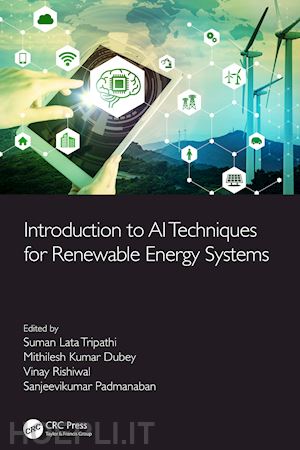Chapter 1: Artificial Intelligence: A New Era in Renewable Energy SystemsKandra Prameela1, Challa Lahari, Grandhi Sai Kishore, Kandula Venkata Nikhil, Pavuluri Hemanth Chapter 2: Role of AI in Renewable Energy Management Anupama Sharma, Sanjeev Kumar Prasad, Rashmi Chaudhary Chapter 3: AI-based Renewable Energy with Emerging Applications: Issues and ChallengesOmkar Singh, Mano Yadav, Preeti Yadav, Vinay Rishiwal Chapter 4: Foundations of Machine LearningNeeta Nathani, Abhishek Singh Chapter 5: Introduction of AI techniques and ApproachesNamrata Dhanda, Rajat Verma Chapter 6: A Comprehensive Overview of Hybrid Renewable Energy SystemsAmit Kumer Podder, Muhammed Zubair Rahman, Sujon Mia and S M Fuad Hossain Fahim Chapter 7: Dynamic Modelling and Performance Analysis of Switched-Mode Controller for Hybrid Energy SystemsSS. Linnet Jaya, V. Kirubakaran Chapter 8: Artificial Intelligence and Machine Learning Methods for Renewable EnergySushila Palwe, Prerna Lahane Chapter 9: Artificial Neural Network Based Power Optimizer for Solar Photovoltaic System: An Integrated Approach with Genetic AlgorithmS.R.Revathy, V.Kirubakaran Chapter 10: Predictive Maintenance: AI Behind Equipment Failure PredictionS.Sharanya, Revathi Venkataraman, G. Murali Chapter 11: AI Techniques for the Challenges in Smart Energy SystemsS. Dwivedi Chapter 12: Energy EfficiencyHar Lal Singh, Sarita Khaturia1 and Mamta Chahar Chapter 13: Renewable Energy from Plant Biomass and Photosynthetic Organisms and its OperationsRajesh K. Srivastava Chapter 14: Evolving Trends for Smart Grid Using Artificial Intelligent TechniquesPooja Yadav, Prakhar Chaudhary, Hemant Yadav Chapter 15: Introduction to AI techniques for Photovoltaic Energy Conversion SystemSiddharth Joshi, Nirav Karelia Chapter 16: Deep Learning Based Fault Identification of Micro Grid TransformersS. Poornima Chapter 17: Power Quality Improvement for Grid Integrated Renewable Energy Sources: A Comparative analysis of UPQC Topologies Nirav Karelia, Amit Sant, Vivek Pandya Chapter 18: AI based Energy Efficient Fault Mitigation Technique for Reliability Enhancement of Wireless Sensor NetworkSyed Mufassir Yaseen, Mithilesh Kumar Dubey, Majid Charoo Chapter 19: AI Techniques Applied to Wind EnergySwagat Kumar Samantaray, Shasanka Sekhar Rout Chapter 20: Comparative Performance Analysis of Multi-Objective Metaheuristic Approaches for Parameter Identification of Three-Diode Modelled Photovoltaic CellsSaumyadip Hazra, Souvik Ganguli Chapter 21: Artificial Intelligence Techniques in Smart GridIrtiqa Amin, Dr. Mithilesh Dubey Chapter 22: Parameter Identification of a New Reverse Two Diode Model by Moth Flame Optimizer Saumyadip Hazra, Souvik Ganguli, Suman Lata Tripathi Chapter 23Time-Series Energy Prediction and Improved Decision MakingIram Naim, Tripti Mahara












